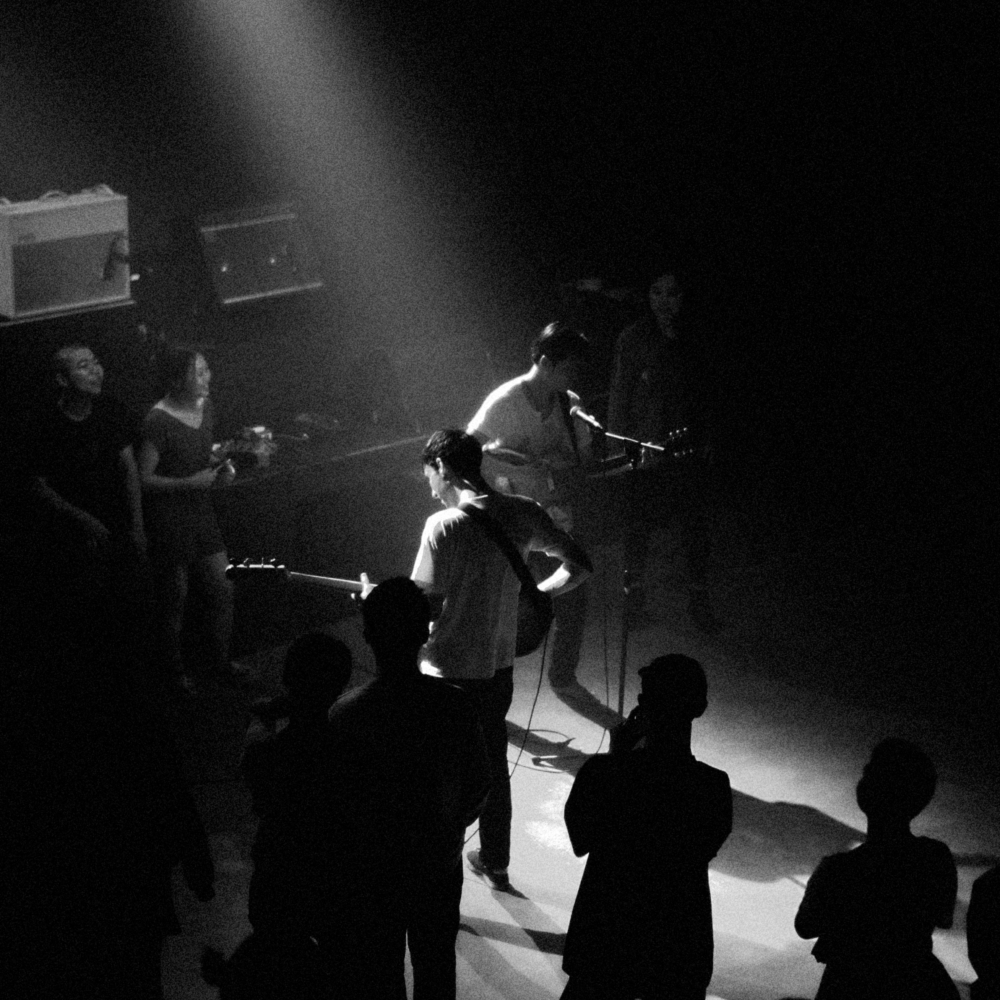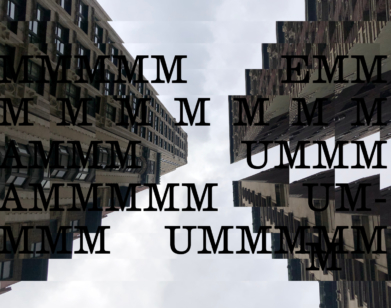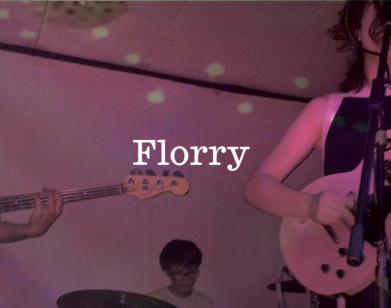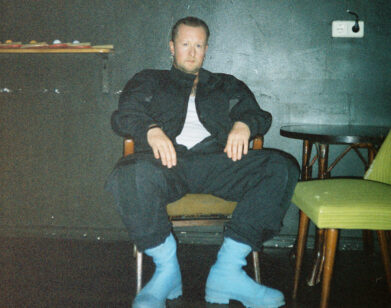Gong Gong Gong is the Chinese Noise Band Making Music for a Borderless World

You can call Gong Gong Gong a Canadian band, a Chinese band, or, more precisely, a Hong Kong band. The duo, formed of Tom Ng and Joshua Frank, first started making dark rhythms that sound like the blues run through a post-industrial processor, in Beijing. Since 2015, the pair have been making something on the end of spectrum to noise music, circular guitar hymns written in post-globalization palette of Mandarin and Cantonese dialects. Location, dislocation, the everywhere of nothingness, the nothingness of everywhere, all find a roof in the Ng’s and Frank’s global project, distributed, of course, by a Brooklyn-based label (Wharf Cat Records). This past fall, Gong Gong Gong released their first U.S. single “Siren,” a song that lacks anything resembling traditional borders or familiar points of reference. Instead, listeners are given a totalizing soundscape that brings to mind a pure immersion in a foreign land. It’s an exceedingly rare experience in any genre or medium. With the pair in New York City for a show at Brooklyn’s Union Pool, Interview met up with the band at the Bruce Nauman retrospective at the Museum of Modern Art. There the conversation turned to translating lyrics for your bandmate to sing, creating across cultural boundaries, and the beauty of onomatopoeia.
———
RICHARD TURLEY: Having been to China the grand total of one time, the lasting impression I had of it is having experienced a far more diverse, rebellious, inspiring culture than the grey, monolithic version of China that’s presented on a daily basis in the West.
TOM NG: Most of the people in Hong Kong really dislike living in China. Beijing is really different in a very interesting way. One thing that made me really like Beijing is that there are almost like no rules there. No one cares about you. No one cares about what you do. It’s very different from Hong Kong, which is this really sad system with rules allied to everything. No accidents happen at all. Everything is expected.
JOSHUA FRANK: In terms of talking about freedom and people’s impression, China is full of restrictions. There’s a lot of context which I’m not super down to talk about, but I also think that we can’t fully speak to what it’s actually like to be here. We don’t represent Chinese musicians in China. The thing that Tom was describing in terms of this freedom or possibility in Beijing is totally true. It’s shifted over the years, too, but there was this idea of independent music, noise music, that was so fresh. You had people discovering music from Bo Diddley to Wolf Eyes all at the same time.
TURLEY: Your music is very disconnected, dislocated in a way. It doesn’t geographically locate itself.
FRANK: The melodic aspects of what makes it sound unplaceable are a result of the music I heard growing up. In that sense, it’s not a conscious choice. I’m not going to play something that sounds like the Ramones because that’s too western. There’s no real concept of that. It’s just our experiences and musical influences have happily consolidated. When we play together, that’s able to come out. Tom probably grew up listening to crazy Cantonese pop and Talking Heads and like Velvet Underground and the Monks.
NG: Oh yeah.
FRANK: I listened to some of those things but probably not in the same proportions. My parents would play me West African guitar music or like Indonesian gamelan music. If you play in a band with like a standard rock band set up — which is totally uninteresting to both of us — you can’t go in those directions. This way, you can go in any direction.
TURLEY: I think any kind of creative endeavor begins with an agreement of the units to be used. That in itself dictates the thinking, which in turn dictates the process, which produces the product, the outcome. Or some combination or re-ordering of those parts. But the idea is, you establish routines to be followed or broken. And the more you challenge common fundamentals early on, the more likely it is that new outcomes emerge. You said something earlier about accidents. Do you feel there is a methodology involved in your music around the engineering of accidents and mistakes?
NG: Pretty much. That’s what I’ve been thinking. You do your own stuff until you see it for yourself. You get different results. Especially what we are doing musically, that’s something we couldn’t expect until we saw the outcome.
 Joshua Frank and Tom Ng.
Joshua Frank and Tom Ng.
TURLEY: Can you explain a bit about your process?
NG: It’s pretty random. We just jam in the studio, and if something sounds good then it becomes a song.
FRANK: “Siren” was basically one of the first things we wrote before we even had a band name at our first or second practice.
NG: Just the first practice. It basically sounds the same as it does now, we didn’t change much. But, it took me something like four years to finish the lyrics because of language.
TURLEY: [Laughs.]
NG: The pronunciation has to be exact. You can’t really alter the language, so I have to find the right words to fit into the melody and give it some meaning too.
TURLEY: Is that challenging in Mandarin?
FRANK: It’s harder.
NG: It’s actually really challenging, which I like because I think nobody writes songs like that.
TURLEY: Why is that?
NG: First, the melody, if I have a set melody for a certain song, then I have to find the right word to put into that so it sounds right. If I change the tone, it would be a different word. It just won’t make sense. The word choice is really limited because of the sound. Out of those limited choices, you have to try and express something.
TURLEY: That’s crucial when creating, though — isn’t it? To limit your choices?
NG: I really enjoy doing it.
TURLEY: It’s like a reverse jigsaw puzzle. You have the pieces but no picture.
FRANK: On the topic of cultural weird overlap and connections between cultures, I can speak and read Mandarin, but Cantonese sounds totally different. For me to understand what Tom is singing, I have to look at the words on the page. I’ve been translating lyrics, but also some diction in Cantonese is slightly different. So then how do you translate an abstract poem in your second language? It’s very, very difficult. The conversation about how to best convey the meaning and feeling of the lyrics is an ongoing process, too. We have a full album’s worth of material where song is just preliminary or second translations. I remember when I was a teenager, I’d try and Google Translate poems back and forth and back and forth between languages and see how it would gradually decay.
TURLEY: It feels like there are these reoccurring themes that you keep talking about — I don’t know if you’re even aware of them — of this unconscious meshing of cultures, meshing of language, meshing of rhythm. Blended opposing forces acting upon each together.
FRANK: I think there’s a lot of truth to that. Another thing, some of these things are easy enough to sort of rationalize after the fact.
TURLEY: [Laughs.] Always.
FRANK: Or to use it as a framework, which I think is valuable too. It makes me think of the name Gong, Gong, Gong, itself. It was based on a deliberate misreading of a sign outside of our practice space in Beijing. In Chinese, you can read left to right, top to bottom, or you could read it like top to bottom, right to left. I would often make jokes at my own expense, pretending that I couldn’t read properly. Sometimes I can’t read properly. I couldn’t really speak Chinese, and we were just outside taking a break from our basement rehearsal space looking at this sign and I was like, “Oh, well I’ll read it like that. What if we’re just called Gong Gong Gong? It’s perfect. Right?” It’s perfect for so many reasons. It’s perfect because of the simplicity of the shape. Visually, it’s like a line horizontally, almost like train tracks or something. Taken individually, it looks like an I-beam. This idea of building blocks. It’s easy enough for a Western audience to recognize and say it.
NG: The sound in Chinese can describe our music because it’s so rhythmic: GONG! GONG! GONG!
FRANK: That sign has been there for years. Everyone goes out to have a smoke and just stares at that sign. But I’m the only one who saw that. You know? That comes from being an outsider because I know what it feels like to not be able to read really. I can draw upon that incorrect perspective because it’s still part of my experience in this place.
TURLEY: Post-rationalized deliberate misreadings of highly-intellectualized guttural music. Might your recorded music be described as an accidental consequence of whichever given ideas you’re driving through at that moment?
FRANK: Music is the best expression — the primary expression — of all those ideas. It’s also just like the expression of what our friendship is.
TURLEY: So how would you describe your music?
NG: Well, the most accurate description of the music would be like chopping vegetables on a chopping block while you’re riding on a horse.
TURLEY: [Laughs.] To me it sounds like about the most appropriate approximation of the hell-scape of our times. It feels like a very visceral, primal scream-infused expression of living today.






